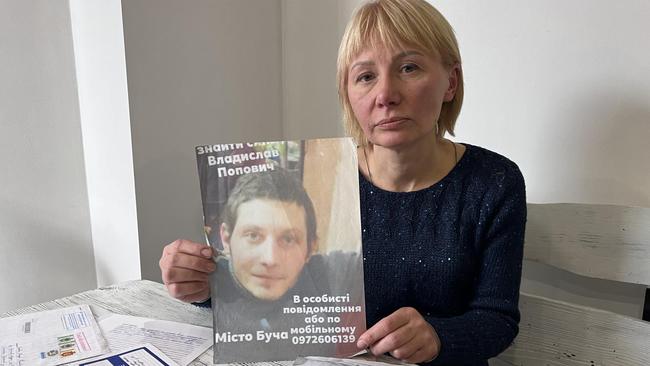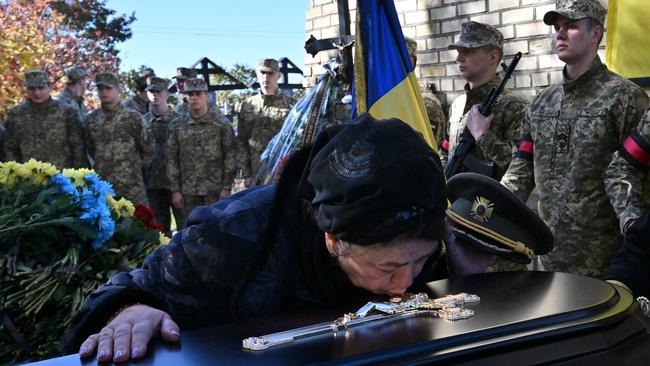Letters bring fresh agony for relatives of Ukraine’s disappeared
A letter from a civilian held prisoner in Russia offers hope but raises difficult questions.

The handwritten letter is only four lines long. Comprising eight brief sentences, written on prison paper, lacking detail and including only a single adjective, it tells little of how its 29-year-old author had managed to stay alive since he was last seen seven months ago, bleeding from a gunshot wound to his right leg and staggering through a garden in Bucha as he tried to escape from Russian troops.
“Hello my dears, I’m OK,” Vladyslav Popovych, a market stall holder, begins. “I am fed three times a day. They give us medical treatment. How are you? I hope I see you soon. I love you very much. Don’t worry about me. Take care of yourselves.”
A Russian prison censor has included their signature beside the word “checked” under Popovych’s signature. Written in May but not delivered until three weeks ago, the letter’s brevity poses more questions than it answers for the missing man’s family – not least why this wounded Ukrainian civilian from Bucha, last seen alive on March 3, should be in jail in Russia and classed as a prisoner of war.
But at least it proves that Popovych survived the massacre in his home town, where the bodies of hundreds of murdered civilians were discovered after Russian forces withdrew following a month-long occupation.
“It is Vladyslav’s handwriting. It is my son,” said his mother, Tatiana, who spent the summer searching for word of her son’s fate. “It is direct proof that he is still alive and that somehow he survived. We just don’t know how to get him back.”
His predicament exemplifies that of hundreds of Ukrainian non-combatants who disappeared during the invasion, many of whom are now wrongly described as service personnel and held in Russian prisons, until their freedom is bartered in exchange for the release of Russian prisoners of war. The 108 Ukrainian women, supposedly all service personnel, who were exchanged for 110 Russian women on Monday included 12 civilians.
There is no accurate figure for the number of Ukrainians being held in Russia either as soldiers or civilians. The International Committee of the Red Cross, which is entitled to unimpeded access to prisoners of war under the terms of the Third Geneva Convention, has been repeatedly obstructed at Russian detention centres.
Based on the available evidence, the UN Human Rights Monitoring Mission in Ukraine noted last month that hundreds of Ukrainian civilians, mostly men of military age, had vanished from areas captured by Russian forces since the invasion began on February 24. Many passed through chaotic localised screening centres and improvised filtration camps before reappearing in Russian prisons.
Forced displacement, involuntary assimilation and wrongful incarceration are again concerns now the pro-Russian authorities in occupied Kherson have begun to transport thousands of Ukrainians from the city. Between 50,000 and 60,000 Ukrainians will be shipped from Kherson to the left bank of the Dnipro, pro-Russian officials there say, supposedly to escape the imminent Ukrainian offensive. Many of those may be deported to Russia.

Popovych was lucky to make it as far as a Russian prison. He dropped food supplies to his grandmother in Bucha as Russian troops entered the town and was with his stepmother attempting to reach home when their car was riddled with bullets and caught fire. The two became separated as they tried to flee. His stepmother was shot in the face and back and collapsed. Witnesses saw Popovych the following day, covered in blood and unable to stand, crawling through a garden with a bullet wound in his leg. Then he disappeared.
His mother Tatiana, who by chance was outside Bucha when the town was seized, spent weeks trying to learn of her only son’s fate after the Russians withdrew. She plastered photographs of him on walls and fences, posted his details on social media, scoured the rubble of houses to see if he had died while hiding inside and even examined bodies from among the 458 dead civilians exhumed from mass graves to see if his corpse was among them.
“It was totally chaotic,” she said. “Most people had been hiding in their basements through the occupation and knew only parts of what had happened. Some people were afraid to tell me that my son had been shot and then disappeared. Others were sure he was dead and told me to give up my search. But he is my son. I could not give up on him.” Tatiana also gave her son’s details to the ICRC, hoping the organisation might find him in a Russian prison, and to the Ukrainian organisation that is responsible for documenting and tracing the missing, the National Information Bureau.
However, the first clear sign that her son might still be alive came from another prisoner. In early May Tatiana was contacted by Serhii Kodratenko, 32, a painter and decorator. He had been arrested by the Russians outside Bucha in March and was held for a time in a prison in the Russian city of Kursk before becoming one of 17 civilians released alongside 50 soldiers in exchange for Russians PoWs in late April. Seeing her posts on social media, Kodratenko contacted Tatiana to say that her son was still alive. He had not met Popovych personally but each morning, during the prisoners’ roll call along a corridor in the Kursk prison, he had heard Popovych shout out his name — and memorised it. Ukrainian detainees held in Russian prisons commonly memorise groups of their fellow captives’ names in an attempt to build mental databases of their detained countryfolk.
A summer of silence followed until, on September 16, the brief letter from Popovych arrived. One of 1000 letters from prisoners, facilitated by the ICRC, it had passed into the hands of the National Information Bureau before being delivered to families of detainees in Ukraine. It had taken four months to arrive.
Brief and redacted, Popovych’s words at least proved that he was alive. She has heard nothing since.
“I have never received any information from any organisation supposed to be tracing our missing,” she said. “The only organisation that did contact me said that they were collecting evidence for war crimes trials at The Hague. I had no interest in that answer.
“It is irrelevant to me. I just want to know how to get my son back from a Russian prison.”
The Times

To join the conversation, please log in. Don't have an account? Register
Join the conversation, you are commenting as Logout